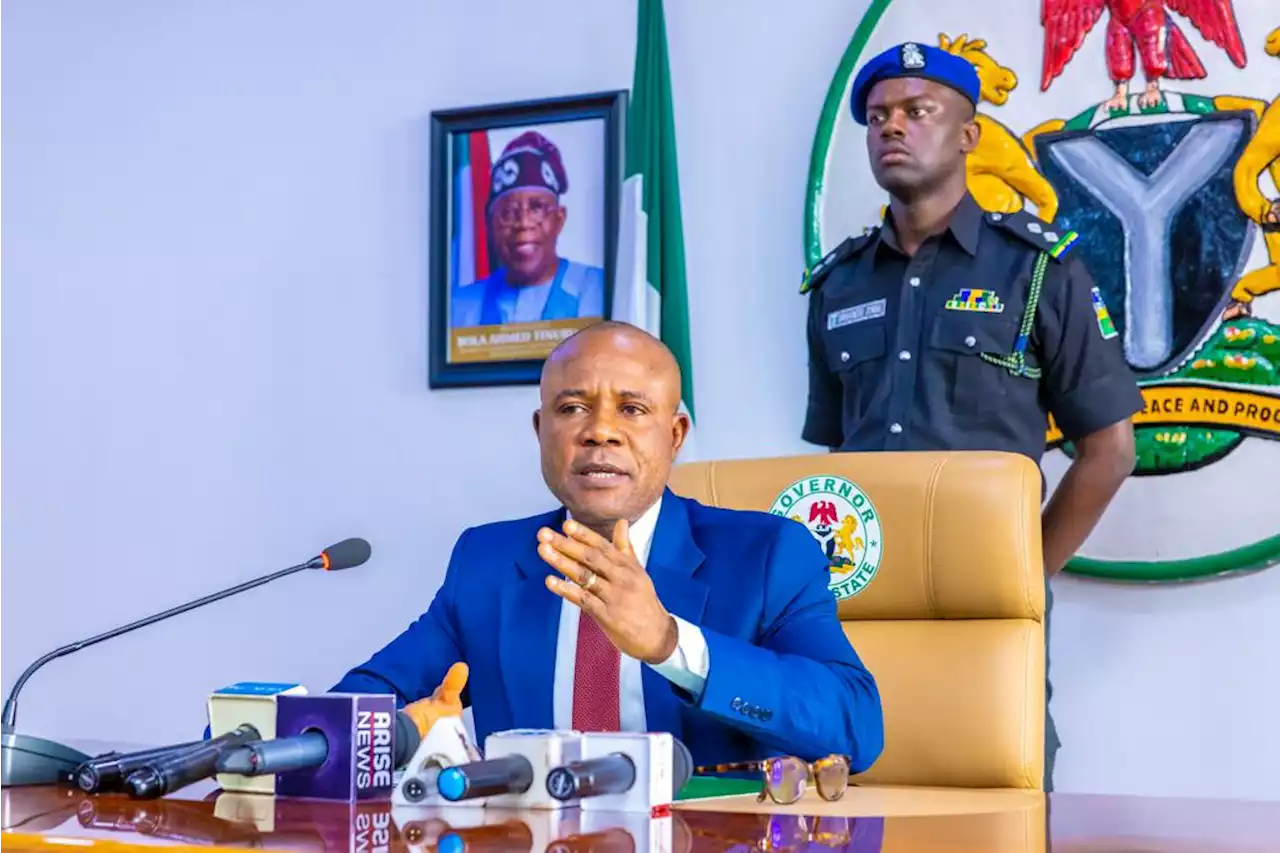NEWS
Disbursement of FG’s Cash Transfer Commences for 25,000 Abia Beneficiaries

The Abia Government has commenced the Federal Government’s Renewed Hope Cash Transfer (RHCT) for 25,000 poor and vulnerable persons from the 17 Local Government Areas (LGAs) of the state.The Programme Manager in charge of the disbursement in Abia, Mrs Adanna Oke, told newsmen in Umuahia, that the disbursement of the fund started on Tuesday at the Umuahia Township Stadium.
She said that no fewer than 800 beneficiaries from Isiala Ngwa North LGA received their debit cards for cash withdrawal on the first day. She said that beneficiaries from Isialangwa Ngwa North, Umuahia North and Aba South LGAs had so far received theirs, adding that the disbursement was programmed to last for two weeks.She also said that the beneficiaries would cash the first two tranches at once after getting their cards and use the same card to withdraw the third tranche in their communities.Oke described the programme as a Federal Government’s initative, in collaboration with the World Bank and State Governments.She said, “This programme is called Renewed Hope Cash Transfer. It used to be House Hold Uplifting Programme.“It is a programme where we supervise the disbursement of stipends to the beneficiaries across the state.“It is going on simultaneously across the country, but we are responsible for beneficiaries in Abia.”According to her, the list of the beneficiaries was compiled from a social register from National Cash Transfer Office (NCTO), Abuja.“We have the social register, where the names of beneficiaries were sent from NCTO, Abuja to the states.“The NCTO is responsible for generating the names.“It also has a State Operating and Coordinating Unit that is responsible for going into the communities to collect relevant data.“The information they gathered from people will determine the category the respondents will be placed.“The data helps the World Bank to decide if a person is actually poor and vulnerable or not,” Oke also said.She commended Gov. Alex Otti for supporting the programme and assisting Abia indigenes to get their fair share of the RHCT.“We are grateful for the gift of good governance and we can only pray to God to strengthen the governor.“We also thank him for all the support we are getting at the state Cash Transfer Unit.“We also thank the Commissioner for Poverty Alleviation and Social Protection, Mrs Blessing Felix, and Special Adviser to the Governor on Policy and Intervention, Rev. Fr. Christian Anokwuru, who is also the Focal Person for National Social Investment Programme in the state, for their support”.Also speaking in an interview, the commissioner urged the beneficiaries to invest their stipends in businesses that would improve their livelihoods.“I came to actually meet with the beneficiaries, where they are receiving their money to improve their livelihoods.“All of them have a debit card assigned to them by the Federal Government under the Renewed Hope Initative.“I’m very happy to see the large turn out of people today to receive their cards.“It is hoped that the money will provide a lot of support to the beneficiaries, who need financial assistance.“It is a three tranche programme. This is the first two tranches.“There will be another one before another set of beneficiaries will be selected,” Felix said.Some of the beneficiaries, including Blessing Alozie and Monica Mba, who confirmed the receipt of their debit cards, appreciated the Federal Government’s kind gesture and promised to invest the fund in their petty businesses. (NAN)Foreign News
Five Arrested over Plot to Attack German Christmas Market

Five men have been arrested in Germany suspected of being involved in a plot to drive a vehicle into people at a Christmas market.
Three Moroccans, an Egyptian and a Syrian were detained on Friday over the plan to target a market in the southern Bavarian state. Authorities said they suspected an “Islamist motive”.
Prosecutors said the Egyptian – a 56-year-old – was alleged to have “called for a vehicle attack… with the aim of killing or injuring as many people as possible”.
The Moroccans allegedly agreed to carry out the attack.Officials in Germany have been on high alert after previous attacks at Christmas markets, including in Magdeburg last December that killed six people.
Authorities did not say when the planned attack was supposed to take place or which market was the target, though said they believed it to be one in the Dingolfing-Landau area, north east of Munich.
German newspaper Bild reported the Egyptian man was an imam at a mosque in the area.
Police said the Moroccan men – aged 30, 28 and 22 – were arrested accused of having agreed to commit murder, while the Syrian man, a 37-year-old, was accused of encouraging the suspects “in their decision to commit the crime”.
The five suspects appeared before a magistrate on Saturday and remain in custody.
Joachim Herrmann, Bavaria’s state interior minister, told Bild the “excellent cooperation between our security services” had helped to prevent “a potentially Islamist-motivated attack”.
Christmas markets are popular festive attractions throughout Germany, frequently attracting large crowds and significant tourism.
Security at events has been increased in recent years, since an attack in Berlin in 2016 when a man drove a lorry into a market crowd, killing 12 people.
NEWS
NAF Begins Nationwide Aptitude Test for 2025 Recruitment of 20,000 Candidates

No fewer than 20,000 applicants nationwide are participating in the Nigerian Air Force (NAF) Zonal General Aptitude Test for the 2025 Basic Military Training Course (BMTC) 46 recruitment exercise.
The Director, Public Relations and Information of NAF, Air Commodore Ehimen Ejodame, in a statement on Sunday, said the aptitude test began on Saturday across the country.
Ejodame, who described the test as a key stage of the recruitment process, said, it was being conducted simultaneously at 15 zonal centres located in Sokoto, Minna, Kaduna, Kano, Bauchi, Maiduguri, Yola, Makurdi, Jos, Ilorin, Ipetu-Ijesa, Enugu, Benin, Port Harcourt and Ikeja.
He said the nationwide spread of the centres reflected NAF’s commitment to inclusiveness, equal opportunity and a transparent, merit-based recruitment system that allows qualified Nigerians from all parts of the country to compete fairly.
According to him, the large turnout underscores the sustained confidence of Nigerian youths in the Air Force as a disciplined, professional and patriotic institution, as well as its resolve to attract capable, motivated and resilient personnel to strengthen national defence and internal security operations.
Speaking on the exercise, the Chief of the Air Staff (CAS), Air Marshal Sunday Aneke, said the recruitment process was guided by fairness, integrity and strict adherence to established standards.
According to CAS, the NAF remains firmly committed to recruiting the best candidates by merit, “as the quality of our personnel is fundamental to operational effectiveness and the successful execution of our constitutional mandate.”
He added that the aptitude test was a critical step toward building a motivated and mission-ready force, assuring Nigerians of the NAF’s continued support to internal security operations and the protection of lives and property.
NEWS
Transportation Expert Lauds Mbah over Security, Infrastructure in Enugu

A transportation expert and elder statesman, Chief Chris Chigboh, has commended Gov. Peter Mbah of Enugu State for the remarkable improvements witnessed in security and infrastructure.
Chigboh, a former Secretary of Transportation in the Federal Capital Territory (FCT), stated this in an interview on Sunday in Abuja.
He spoke shortly after returning from Enugu, where he said he personally observed the transformation programmes being implemented by the Mbah administration.
According to him, the developmental strides recorded in the state in the last two years indicate that Enugu is on course to surpass the governor’s target of building a 30-billion-dollar economy by 2031.
“What I saw in Enugu beats my imagination, especially when compared with the state’s lean receipts from the federation account.
“The security operation control centre is second to none. The recent addition of drones and other security infrastructure will help flush out terrorists and criminal elements from the state.
“With these measures, citizens are set to enjoy a crime-free Yuletide and New Year celebrations. The latest transportation infrastructure will also ease movement of goods and services across the state,” he said.
Chigboh said terrorism and banditry had negatively affected development plans in many parts of the country, leaving citizens in fear and deepening economic hardship.
He expressed satisfaction with the recent deployment of surveillance drones in a late-night operation around the Opi–Nsukka/Ugwogo–Nike forest, a notorious kidnappers’ hideout, noting that the operation led to the evacuation of bandits from the area.
“With the frontal attacks on criminals in Enugu, the state will attain greater economic prosperity in the near future,” he added.
The state government recently added two surveillance drones and 10 security vehicles to its security fleet. It also procured 200 BRT buses and several electric vehicles for commercial transportation.
Chigboh, who also served as Secretary of Area Councils in the FCT, commended the cleanliness of Enugu metropolis and the rollout of smart schools across political wards in the state.
He described the expansion of the capital city through new estates on its fringes as a creative move to accommodate current and future population growth.
The elder statesman also lauded the introduction of electric vehicles for public transportation and urged the governor to complement the initiative with a rail network.
The rail line, he said, would link all local government areas, to boost commerce and facilitate the movement of food from rural communities to major markets.
“Mbah can partner with the Federal Government to revive portions of the Eastern railway corridor by putting the abandoned Agbani–Emene transit line to use.
“This will significantly improve travel and haulage within Coal City,” he said.
Chigboh, who was involved in the design and implementation of the Abuja Master Plan, noted that the harmonious relationship between the executive and legislative arms of government in Enugu was responsible for the peace and coordinated development currently witnessed.
He described Mbah’s socio economic reforms as unprecedented in the history of the state and called on residents to support government initiatives, especially in the area of security, to sustain Enugu’s status as the safest state in the South-East.
He urged chairmen of the 17 local government areas of the state to emulate the governor by extending development efforts to rural communities.




















